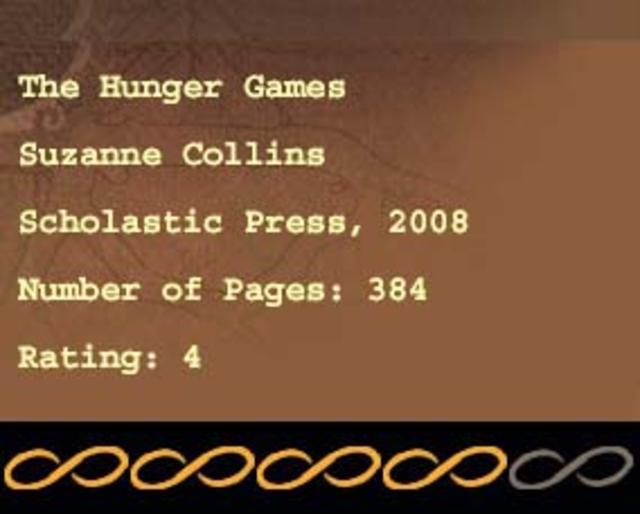A Review of The Hunger Games
The Hunger Games by Suzanne Collins is one of my favorite books published this year.

In this book, Katniss Everdeen tells us her futuristic story in the present tense. Katniss lives in Panem, a country that “emerged out of the ashes of what was once called North America.”
Panem is divided into 12 districts and the Capitol. The Capitol, where all the rich and powerful people live, exerts tyranny over the districts, which are extremely poor and are kept back in technology. When the districts rebel, they are beaten in a war by the Capitol, who then completely destroys the thirteenth district. The Capitol invents the hunger games as a punishment for anyone who rebels. It is a yearly event where each district must send in two teen tributes, one male and one female, and 24 tributes fight to the death in an arena. The last one alive is the winner, and is showered with riches and good housing. But there can only be one winner out of the 24 and it is mandatory that every citizen watch this televised event.
74 years after the war, and the invention of the hunger games, Katniss takes her sister’s place as a tribute, to save her life. This is when the story takes place.

Suzanne Collins was inspired to write this sure to be classic, by the Greek myth of Theseus and the Minotaur, where seven boys and seven girls were sent from Athens to a labyrinth where they would be devoured by a monster called the Minotaur. She was also very influenced by Roman gladiator fights.
One thing I love about the book is how she conveys the thirst, hunger, and raw anger of Katniss and other tributes. She shows us how these emotions can shape a person. She also does a wonderful job with explaining the political aspects of the book, like the power structures in Panem. The narrator and main character, Katniss, is credible and the reader is sympathetic to her; in fact, she seems like a real person. Katniss was the most well-developed character I’ve read about since Holden Caulfield in The Catcher in the Rye.
Collins makes clever use of flashbacks in order to cover a huge time span, but also to get inside Katniss’s mind and memory. The flashbacks also serve to teach us about the changing political landscape in Panem.
The one negative point is that Collins’ writing is unnecessarily melodramatic at times. A major example of this is her portrayal of the budding three way romance between Katniss, Gale, and Peter, which seemed lifted out of the most stereotypical soap opera, and had me yawning. Were the romance better developed and realistic, it would have fit perfectly into the story. While Collins does a great job of Katniss’s love for her sister and her late father, she is awful with this romance.
Because of the horrific kid-vs-kid violence, this book was rated for 12 years and older. I’m 11 and feel that an eight year old could read this book without being disturbed by it. I’d recommend this to anyone above age eight who wants to have an enjoyable and thought-provoking read.
What do I like in it, personally? Quite frankly, all of it. All in all, Suzanne Collins pulls us through this heart-rending story, and isn’t afraid to let us trip and fall along the way.

Akash Viswanath Mehta is a senior at Saint Ann’s School in Brooklyn, New York. He is deeply interested in politics, literature, and mathematics. He’s also the founder of Kids for a Better Future, an organization of teens in New York City, supporting less fortunate children around the world.
